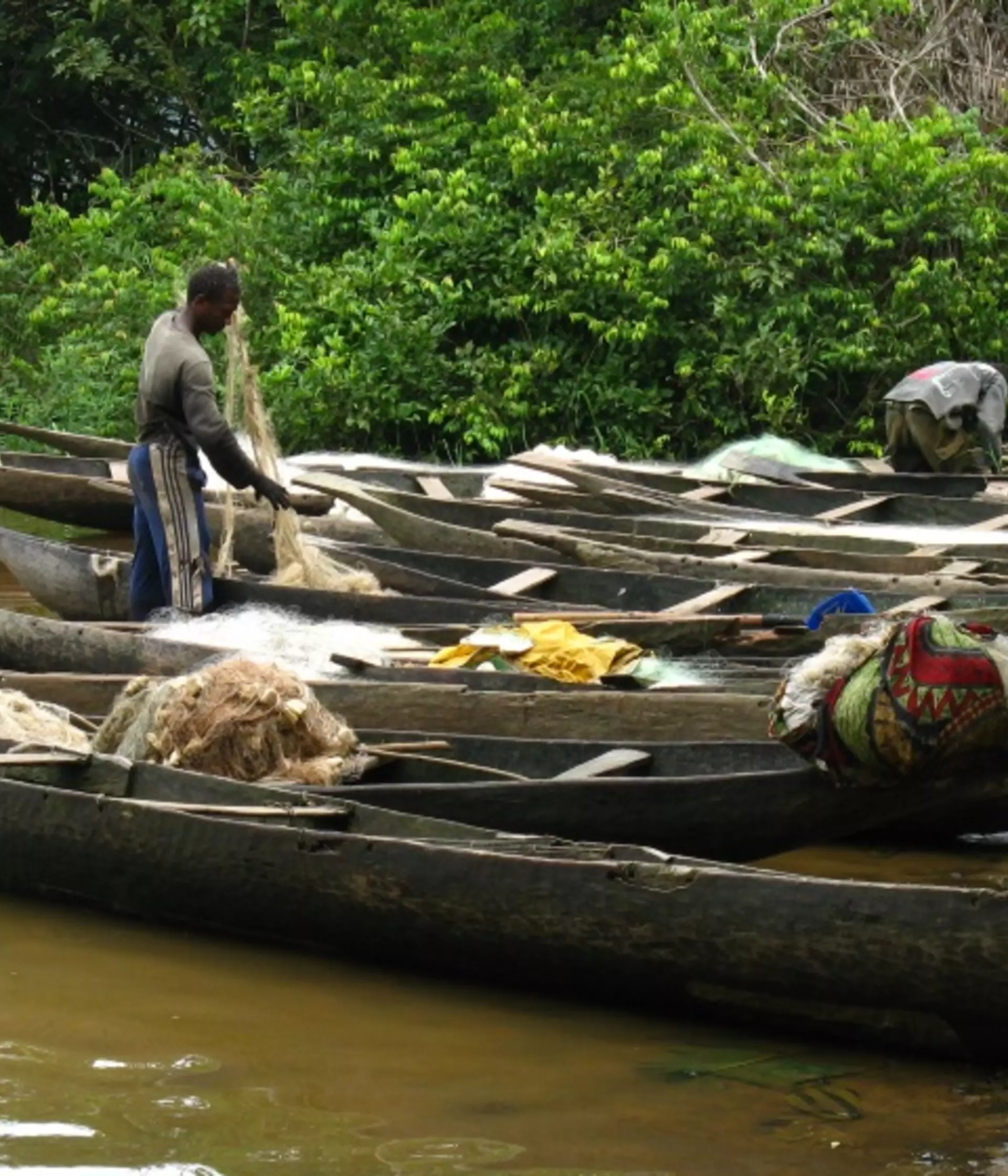The Douala-Edéa ecosystem
Douala-Edéa faces great pressures: extensive areas of mangroves have been lost due to rapidly growing demand for wild foods, wood and land for farms, plantations and settlements; whilst illegal poaching, overfishing and unsustainable fishing practices are diminishing wildlife populations and compromising food security among local communities.
The Douala-Edéa coastal ecosystem – which includes mangroves, beaches, swamps, rainforests, rivers and freshwater lakes south of Cameroon’s second largest city, Douala – remains one of the last opportunities to conserve a large expanse of African coastal wildlands and wild waters.
The tangled mangroves and vast swamp forests have long protected this highly productive land and seascape, which sits within the Atlantic Equatorial Coastal Forest Ecoregion. Threatened species such as forest elephants, chimpanzees, mandrills, African soft-shelled turtles, marine turtles, sharks, rays and West African manatees still find refuge in this unique mosaic of habitats.
The wetlands are a haven for birdlife with over 70 waterbird species recorded, many overwintering after long migrations from Europe and Asia. They are also an important nursery area for a variety of fish and crustaceans, providing the basis for productive fisheries that local people depend upon for food security.
More than 10,000 people in over 40 villages and settlements live in this landscape. These local communities are diverse, comprised of indigenous coastal and riparian ethnic groups, plantation workers and other economic migrants from elsewhere in Cameroon and West Africa.
Many are challenged by poverty, caused in part by the decline in artisanal fisheries on which they largely depend. They have no access to financial support services and the erosion of community self-support networks exacerbates the issue.
Some of this wild landscape is formally protected including the 2,629km2 Douala-Edéa National Park and the smaller, Lake Ossa Wildlife Reserve (40km2). The Douala-Edéa National Park was upgraded from Wildlife Reserve status in 2018, during which it doubled in size and it now includes 300km2 of previously unprotected mangroves.
Our Douala-Edéa conservation work
In partnership with the Conservation Service and local NGOs, we’ve been working in this landscape since 2014, initially in the Lake Ossa Wildlife Reserve to pilot initiatives that engage local communities in the co-management of the reserve and its resources. More recently we have expanded our work to the Douala-Edéa National Park, specifically Lake Tissongo (another important site for manatees) and the mangrove areas around Siossio which are key for fish species, manatees, sharks and rays.
Our activities cover two main areas of work
1. Using nature-based solutions by building human resilience and strengthening local engagement in conservation through:
-
Creating strong sustainable community associations, using the Village Savings and Loans Association (VSLA) approach, which provides locally appropriate access to financial services. All funds are retained within the community, building social capital and providing a platform to engage the broader community in resource management. 35 VSLAs have been established so far in the Douala-Edéa Landscape (Lake Ossa Wildlife Reserve and Douala-Edéa National Park), with a total of 932 members (591 women and 341 men) and total savings of £55,000 so far.
-
Developing conservation incentives for fisher communities such as collection and recycling of old and discarded fishing nets, which can trap aquatic species. The nets are sold and exported to generate income for these communities. The income from this programme is managed through the VSLAs, benefitting the communities whilst reducing plastic pollution in aquatic ecosystems. Over 11 tonnes of discarded fishing nets have been removed from the Lake Ossa Wildlife Reserve and Douala-Edéa National Park so far.
-
Developing fisheries management plans to regulate practices in the Reserves. A plan has been agreed with all Lake Ossa communities, which sets aside 6.5% of the lake as no-take zones to protect important sites for fish and manatees. These will also be developed with communities in Lake Tissongo and Siossio.
2. Strengthening wildlife protection through:
-
Carrying out biodiversity surveys in the marine and freshwater systems to determine important sites for the protection of critical aquatic species such as manatees, sharks and rays, and monitor the impact of existing no-take zones in Lake Ossa on fish and manatee populations.
-
Protecting threatened species from overexploitation and hunting by strengthening management capacity and law enforcement patrols in Protected Areas.
-
Halting both habitat loss and overexploitation of fisheries, mangroves and forest, through co-management plans and mechanisms. Six tree nurseries have been established in Lake Ossa, providing trees and plants to restore 21.5ha of lake shore, helping to prevent erosion and pollution of the lake. Additionally, 20,000 bamboo poles, used for unsustainable fishing practices, have been removed from the lake.
-
Supporting the upgrading of Douala-Edéa Wildlife Reserve to National Park status and the gazettement of the Lake Ossa Wildlife Reserve.
-
Engaging with the private sector eg palm oil industry, to reduce their impact on the Reserves through our SPOTT platform
Key species
-
West African manatee, Vulnerable
-
African soft-shelled turtle, Vulnerable
-
Hawksbill turtle, Critically Endangered
-
Green turtle, Endangered
-
Leatherback turtle, Vulnerable
-
Olive ridley turtle, Vulnerable
-
Daisy stingray, Vulnerable
-
African forest elephant, Critically Endangered
-
Central chimpanzee, Endangered
People involved
Nelson Fawoh manages the Douala-Edéa landscape project
Partners
-
African Marine Mammals Conservation Organisation
-
Ministère des Forêts et de la Faune de la République du Cameroun (MINFOF)
-
The Société Africaine Forestière et Agricole of Cameroon (SAFACAM)
-
The University of Douala
-
Watershed Task Group
-
Wildlife Conservation Society - Cameroon
Sponsors
With thanks to the funders of the project:
-
UK Government’s Darwin Initiative (DEFRA)
-
Players of People’s Postcode Lottery
-
European Union and the Organisation of African, Caribbean and Pacific States through the BIOPAMA Programme
-
Pete and Val Charlton
Urgent action to stop the devastation of critical species and habitats by helping people and wildlife live better together, is the only way to save the natural world we love and depend upon. That’s where ZSL comes in, and where you can play your part.
